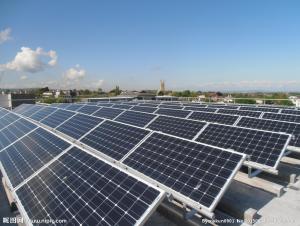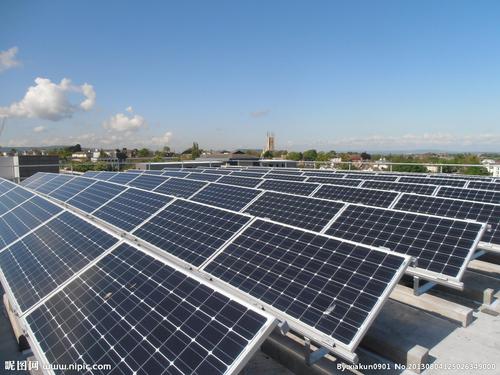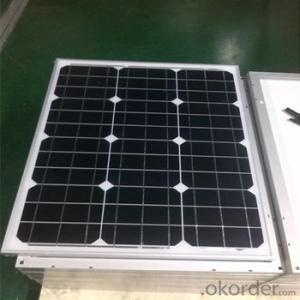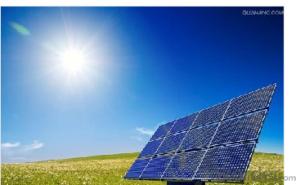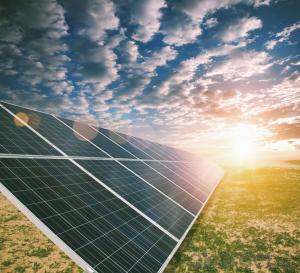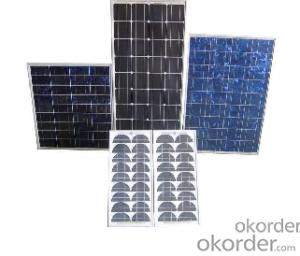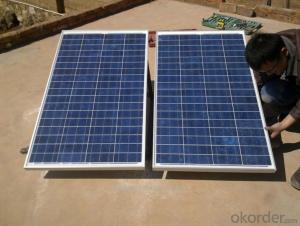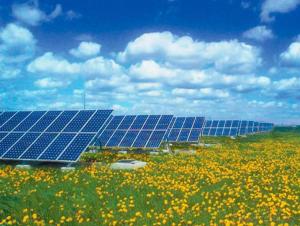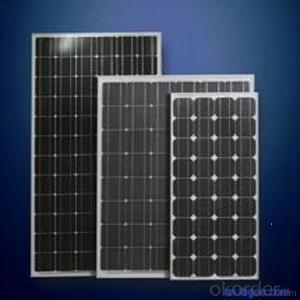Eco Worthy Solar Panels - Solar Module 19
- Loading Port:
- China Main Port
- Payment Terms:
- TT OR LC
- Min Order Qty:
- -
- Supply Capability:
- -
OKorder Service Pledge
OKorder Financial Service
You Might Also Like
Solar Module
ABOUT YINGLI GREEN ENERGY
Yingli Green Energy Holding Company Limited (NYSE: YGE) is one of
the world’s largest fully vertically integrated PV manufacturers, which
markets its products under the brand “Yingli Solar“. With over 7.0GW
of modules installed globally, we are a leading solar energy company
built upon proven product reliability and sustainable performance. We
are the fi rst renewable energy company and the fi rst Chinese company
to sponsor the FIFA World CupTM.
PERFORMANCE
- High effi ciency, multicrystalline silicon solar cells with high transmission
and textured glass deliver a module effi ciency of up to 16.0%,
minimizing installation costs and maximizing the kWh output of your
system per unit area.
- Tight positive power tolerance of 0W to +5W ensures you receive
modules at or above nameplate power and contributes to minimizing
module mismatch losses leading to improved system yield.
- Top ranking in the “TÜV Rheinland Energy Yield Test” and the
“PHOTON Test” demonstrates high performance and annual energy
production.
RELIABILITY
- Tests by independent laboratories prove that Yingli Solar modules:
Fully conform to certifi cation and regulatory standards.
Withstand wind loads of up to 2.4kPa and snow loads of up to
5.4kPa, confi rming mechanical stability.
Successfully endure ammonia and salt-mist exposure at the highest
severity level, ensuring their performance in adverse conditions.
- Manufacturing facility certifi ed by TÜV Rheinland to ISO 9001:2008,
ISO 14001:2004 and BS OHSAS 18001:2007.
WARRANTIES
- 10-year limited product warranty1.
- Limited power warranty1: 10 years at 91.2% of the minimal rated power
output, 25 years at 80.7% of the minimal rated power output.
1In compliance with our Warranty Terms and Conditions.
QUALIFICATIONS & CERTIFICATES
IEC 61215, IEC 61730, MCS, CE, ISO 9001:2008, ISO 14001:2004, BS OHSAS
18001:2007, PV Cycle, SA 8000
ELECTRICAL PERFORMANCE
Electrical parameters at Standard Test Conditions (STC)
Module type YLxxxP-29b (xxx=Pmax)
Power output Pmax W 260 255 250 245 240
Power output tolerances ΔPmax W 0 / + 5
Module effi ciency ηm % 16.0 15.7 15.4 15.1 14.8
Voltage at Pmax Vmpp V 30.3 30.0 29.8 29.6 29.3
Current at Pmax Impp A 8.59 8.49 8.39 8.28 8.18
Open-circuit voltage Voc V 37.7 37.7 37.6 37.5 37.5
Short-circuit current Isc A 9.09 9.01 8.92 8.83 8.75
Electrical parameters at Nominal Operating Cell Temperature (NOCT)
Power output Pmax W 189.7 186.0 182.4 178.7 175.1
Voltage at Pmax Vmpp V 27.6 27.4 27.2 27.0 26.8
Current at Pmax Impp A 6.87 6.79 6.71 6.62 6.54
Open-circuit voltage Voc V 34.8 34.8 34.7 34.6 34.6
Short-circuit current Isc A 7.35 7.28 7.21 7.14 7.07
STC: 1000W/m2 irradiance, 25°C cell temperature, AM1.5g spectrum according to EN 60904-3.
Average relative effi ciency reduction of 3.3% at 200W/m2 according to EN 60904-1.
NOCT: open-circuit module operation temperature at 800W/m2 irradiance, 20°C ambient temperature, 1m/s wind speed.
OPERATING CONDITIONS
Max. system voltage 1000VDC
Max. series fuse rating 15A
Limiting reverse current 15A
Operating temperature range -40°C to 85°C
Max. static load, front (e.g., snow) 5400Pa
Max. static load, back (e.g., wind) 2400Pa
Max. hailstone impact (diameter / velocity) 25mm / 23m/s
CONSTRUCTION MATERIALS
Front cover (material / thickness) low-iron tempered glass / 3.2mm
Cell (quantity / material / dimensions /
number of busbars)
60 / multicrystalline silicon / 156mm x 156mm / 2 or 3
Encapsulant (material) ethylene vinyl acetate (EVA)
Frame (material / color / anodization color /
edge sealing) anodized aluminum alloy / silver / clear / silicone or tape
Junction box (protection degree) ≥ IP65
Cable (length / cross-sectional area) 1000mm / 4mm2
Plug connector
(type / protection degree) MC4 / IP67 or YT08-1 / IP67 or Amphenol H4 / IP68
PACKAGING SPECIFICATIONS
Number of modules per pallet 29
Number of pallets per 40' container 28
Packaging box dimensions
(L / W / H) 1700mm / 1135mm / 1165mm
Box weight 568kg
Unit: mm
• Due to continuous innovation, research and product improvement, the specifi cations in this product information sheet are subject to change
without prior notice. The specifi cations may deviate slightly and are not guaranteed.
• The data do not refer to a single module and they are not part of the offer, they only serve for comparison to different module types
- Q: Are there any disadvantages to using solar panels?
- Yes, there are a few disadvantages to using solar panels. Firstly, the initial installation cost can be relatively high, making it a less affordable option for some individuals or businesses. Additionally, solar energy production relies on sunlight, which means that solar panels are less effective during cloudy or rainy days, or at night. This intermittency requires a backup energy source or energy storage system, adding to the overall cost. Moreover, solar panels require a significant amount of space for installation, which may not be feasible in densely populated areas. Lastly, the manufacturing process of solar panels can have environmental impacts, as it involves the use of certain materials and chemicals. However, it is worth noting that continuous advancements in technology are reducing these disadvantages, making solar panels an increasingly viable and sustainable energy solution.
- Q: Why can not the solar panel load directly?
- Solar panels (also known as solar modules) are the core of solar power systems and the most important part of solar power systems.
- Q: I been considering to get a solar panel system but I don't know if I'm going cut my electric bill every month , It's a lot of money to spend and I'm not really sure
- I'm waiting for the gov't to do right thing and subsidize my purchase!
- Q: Can solar panels be installed on a library or educational institution?
- Yes, solar panels can be installed on a library or educational institution. In fact, many libraries and educational institutions are increasingly adopting solar energy systems to reduce their carbon footprint, lower energy costs, and promote renewable energy education. Installing solar panels on rooftops or open spaces of these buildings can provide clean and sustainable electricity, benefiting both the institution and the environment.
- Q: I was thinking of having some installed on our rooftop and was wondering if it would be worth the cost? The house is located in Sac, Cali. The panels would face the sun 2 months out of the year and in the summer roughly 4 hours of straight sun.
- You okorder /
- Q: We see increasing, what appear to be, solar panels on electric poles?
- Create okorder /
- Q: Can solar panels be used in areas with high levels of pollution from transportation?
- Yes, solar panels can be used in areas with high levels of pollution from transportation. While pollution can affect the performance of solar panels by reducing their efficiency, they can still generate electricity even in polluted areas. Regular cleaning and maintenance of solar panels can help mitigate the impact of pollution on their performance. Additionally, installing solar panels in areas with high pollution can contribute to reducing the carbon footprint associated with transportation and help improve air quality over time.
- Q: What is the typical warranty period for solar panels?
- The typical warranty period for solar panels is around 25 to 30 years.
- Q: How much electricity can a solar panel generate?
- The amount of electricity a solar panel can generate depends on various factors such as the size and efficiency of the panel, the amount of sunlight it receives, and the location. On average, a standard solar panel can produce anywhere from 250 to 400 watts of electricity per hour.
- Q: Can solar panels be installed on tile roofs?
- Yes, solar panels can be installed on tile roofs. Specialized mounting systems are designed to secure the panels to the tile roof without damaging it, ensuring a safe and efficient installation.
Send your message to us
Eco Worthy Solar Panels - Solar Module 19
- Loading Port:
- China Main Port
- Payment Terms:
- TT OR LC
- Min Order Qty:
- -
- Supply Capability:
- -
OKorder Service Pledge
OKorder Financial Service
Similar products
Hot products
Hot Searches
Related keywords
